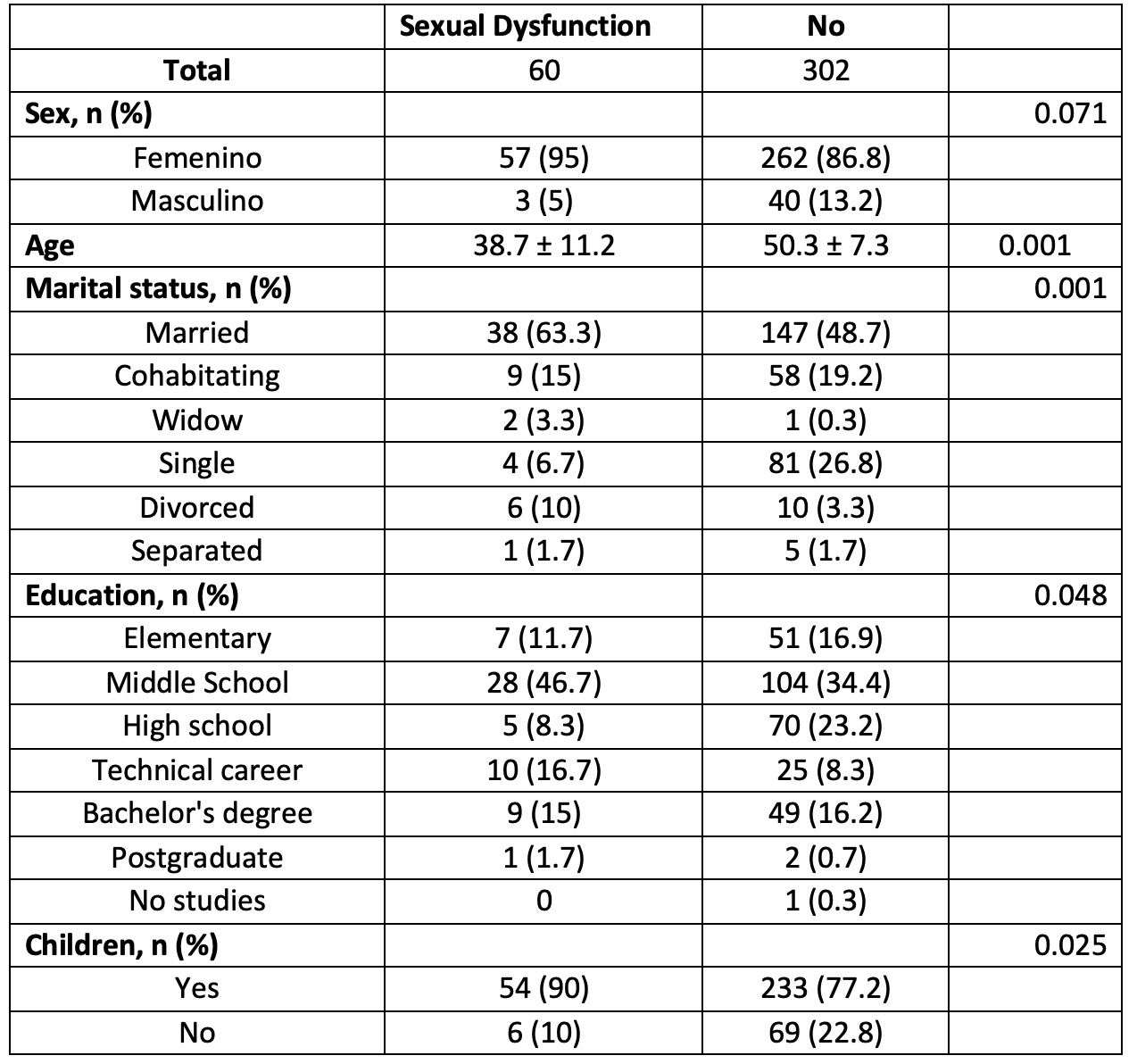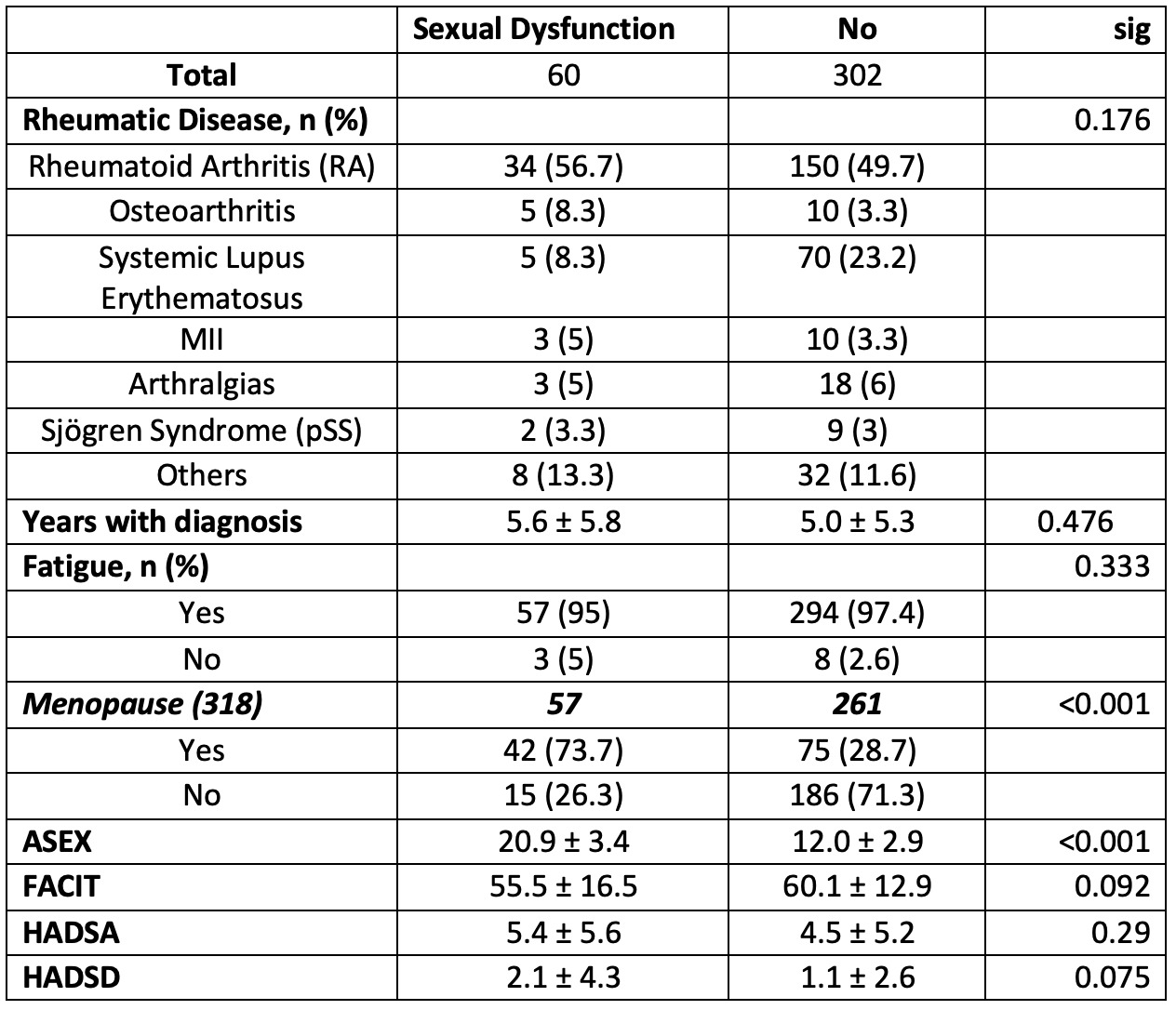Session Information
Date: Sunday, November 12, 2023
Title: (0145–0154) Epidemiology & Public Health – Interprofessional Poster
Session Type: Poster Session A
Session Time: 9:00AM-11:00AM
Background/Purpose: Rheumatic diseases (RD) can have a negative impact on many aspects of a patient’s life, including sexual health. Sexual dysfunction (SD) has been negatively associated with quality of life and disease severity, yet there’s still a barrier to the evaluation and assessment of this impact (1). This study aims to evaluate and describe how patients perceive their sexual performance and characterize their demographics.
Methods: We conducted a cross-sectional study in patients with at least one rheumatologic disease at an outpatient rheumatology clinic in at Hospital Universitario Dr. José Eleuterio González. Those without active sexual life, or pregnancy, and those unwilling to answer the questionnaire reliably were excluded. Patients over 18 years old were evaluated from August 2022 to April 2023 with the Arizona Sexual Experiences Scale (ASEX), Functional Assessment of Chronic Illness Therapy – Fatigue (FACIT-F) and Hospital Anxiety and Depression Scale (HADS). Sociodemographic and medical data were collected from patient files.
Results: We included 893 patients. A third (30%) of patients refused to answer and only 40.54 % (362) reported an active sexual life. Sexual dysfunction (SD) was reported in 60 (17%), with a higher prevalence observed in women (95%) than men (5%) (table 1). The mean age in patients with SD was 38.7± 11.2. Being married, younger, and having menopause were associated with a higher prevalence of SD. The most related diagnosis to SD was Rheumatoid Arthritis (n=34, 56.7%) (Table 2) Patients with SD also presented a tendency for depression and fatigue in clinical scales analysis, but not to anxiety. Less education and having children are also associated with SD.
Conclusion: We found a prevalence of SD of 17% in our population. The presence of menopause, a younger age, and offspring was more frequent in patients with SD. Special attention should be take to these factors in the evaluation of sexuality in patients with rheumatic diseases.
References:
1. Zhao S, Li E, Wang J, Luo L, Luo J, Zhao Z, et al. Rheumatoid Arthritis and Risk of Sexual Dysfunction: A Systematic Review and Metaanalysis. J Rheumatol [Internet]. 2018 [cited 2022 Sep 17];45:1375–82. Available from: www.jrheum.org
4. Minopoulou I, Pyrgidis N, Tishukov M, Sokolakis I, Baniotopoulos P, Kefas A, et al. Sexual dysfunction in women with systemic autoimmune rheumatic disorders: a systematic review and meta-analysis. Rheumatology (Oxford) [Internet]. 2022 Aug 11 [cited 2022 Sep 27]; Available from: https://pubmed.ncbi.nlm.nih.gov/35951753/
To cite this abstract in AMA style:
Vega Sevilla L, Serna-Peña G, Flores-Gutierrez D, Cardenas-De la Garza J, Hernandez Galarza I, Galarza-Delgado D. Sexual Health and Function Screening in Patients with Rheumatic Diseases [abstract]. Arthritis Rheumatol. 2023; 75 (suppl 9). https://acrabstracts.org/abstract/sexual-health-and-function-screening-in-patients-with-rheumatic-diseases/. Accessed .« Back to ACR Convergence 2023
ACR Meeting Abstracts - https://acrabstracts.org/abstract/sexual-health-and-function-screening-in-patients-with-rheumatic-diseases/


